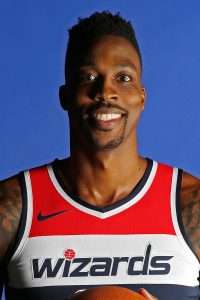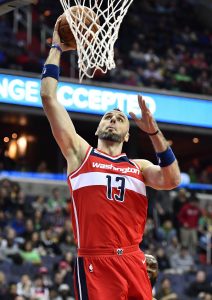Hoops Rumors is breaking down the 2018 offseason for all 30 NBA teams, revisiting the summer’s free agent signings, trades, draft picks, departures, and more. We’ll evaluate each team’s moves from the last several months and look ahead to what the 2018/19 season holds for all 30 franchises. Today, we’re focusing on the Washington Wizards.
Signings:
 Standard contracts:
Standard contracts:
- Dwight Howard: Two years, $10.94MM. Second-year player option. Signed using taxpayer mid-level exception.
- Jeff Green: One year, minimum salary. Signed using minimum salary exception.
- Two-way contracts:
- Non-guaranteed camp contracts:
- Lavoy Allen: One year, minimum salary.
- Chris Chiozza: One year, minimum salary.
- Tiwian Kendley: One year, minimum salary.
- Chasson Randle: One year, minimum salary.
Trades:
- Acquired Austin Rivers from the Clippers in exchange for Marcin Gortat.
Waiver claims:
- Claimed Thomas Bryant off waivers from the Lakers.
Draft picks:
- 1-15: Troy Brown — Signed to rookie contract.
- 2-44: Issuf Sanon — Will play overseas.
Departing players:
- Tim Frazier
- Marcin Gortat
- Ty Lawson
- Chris McCullough
- Mike Scott
- Ramon Sessions
Other offseason news:
- Introduced expansion G League team Capital City Go-Go; hired Pops Mensah-Bonsu as GM and Jarell Christian as head coach.
- Hired Robert Pack as an assistant coach.
Salary cap situation:
- Remained over the cap.
- Carrying approximately $134.9MM in guaranteed salaries.
- Projected tax bill of $19.1MM.
- No free agent cap exceptions left besides minimum salary exception.
Check out the Washington Wizards’ full roster and depth chart at RosterResource.com.
Story of the summer:
After an impressive 2016/17 showing that ended with a Game 7 loss to the Celtics in the Eastern Conference Semifinals, the Wizards took a step back in 2017/18. Washington finished the year as the No. 8 team in the East and was quickly dispatched in the first round of the playoffs by the top-seeded Raptors.
While the performance raised questions about the upside of the Wizards’ current core, injuries were at least partly to blame for the club’s ’17/18 struggles. John Wall missed half the season after undergoing knee surgery and Otto Porter wasn’t able to suit up for the season-ending home loss to Toronto.
Taking into account those factors – along with their lack of cap flexibility – the Wizards decided to give the current core led by Wall, Porter, and Bradley Beal another chance. All three players are back for the coming season, with new role players like Dwight Howard and Austin Rivers joining the mix.
While the front office opted not to make major changes to the roster this summer, 2018/19 will be an important year for this group. If the Wizards fail to win a playoff series once again in a weakened Eastern Conference, it’s not hard to envision a scenario in which the roster looks significantly different a year from now.
 Key offseason losses:
Key offseason losses:
Marcin Gortat‘s five-year run as a Wizard came to an end this offseason, with the team sending him to the Clippers in exchange for Rivers. A deal was long overdue, with Gortat having been mentioned in trade rumors for years. And despite his steady production for the club, it’s not hard to see why Washington wanted to move him.
Gortat, who has always been outspoken with the media, clashed last season with Wall, who responded to perceived criticism from the veteran center by suggesting that Gortat should be grateful for all the “spoon-fed baskets” he got as a result of playing with Wall. The 34-year-old has also shown virtually no willingness to modernize his game, indicating this spring that he had no intention of working on increasing his shooting range. Around the same time, Wall was talking about the Wizards’ need for “athletic” big men.
While it’s certainly possible that Gortat himself wasn’t the problem in the Wizards’ locker room, his days in D.C. were numbered once his differences of opinion with the team’s franchise player became more public and more frequent.
None of the Wizards’ other offseason departures should have an impact on their starting lineup, but they’ll be replacing three backup point guards in Tim Frazier, Ramon Sessions, and Ty Lawson. The loss of Mike Scott shouldn’t be overlooked either. A key reserve, Scott enjoyed a career year for the Wiz in 2017/18, averaging 8.8 PPG with a .527 FG% and .405 3PT%. Having used their mid-level exception elsewhere, the Wizards had no way of matching or topping the $4.3MM offer Scott received from the Clippers.
Key offseason additions:
Already projected to be over the tax line, the Wizards decided to use their full mid-level exception on Howard, a move that will cost them more than his $5.34MM salary due to tax penalties. It’s a fascinating decision, given how quickly he has worn out his welcomes in Houston, Atlanta, and Charlotte over the last three years. The Wizards and Howard all saying all the right things leading up to the season, but it’s a risky move to replace Gortat with Howard and hope that it will help solve last year’s on- and off-court issues.
On the court, Howard certainly has more upside than Gortat, giving the Wizards the sort of rim-protecting center and elite rebounder they’ve lacked in the middle. But he’ll turn 33 this December and is past his prime at this point. Howard has to be willing to accept a complementary role after attempting more than 11 shots per game last season — he shouldn’t be taking many touches from the likes of Wall, Beal, and Porter.
Elsewhere, the Wizards’ additions of Rivers and Jeff Green should bolster a bench that has struggled to produce in recent years. Neither Rivers nor Green is a consistent difference-maker, but they’re solid defenders who should stabilize the second unit. Getting Green on a minimum-salary deal was a particularly nice move.
While Howard, Rivers, and Green should contribute immediately, the best long-term addition for the Wizards this summer figures to be Troy Brown, a talented – but raw – wing who enters his rookie season as the fourth-youngest player in the NBA. The Wizards have made a habit of trading away their first-round picks for veterans over the last few years, and needed an injection of high-upside youth this summer. Brown provides that, becoming the first player the Wizards have drafted in the first round – and kept – since Porter in 2013.
Outlook for 2018/19:
As usual, the Wizards will head into the 2018/19 campaign believing that they’re the best team in the East — just ask Markieff Morris. That confidence hasn’t led to deep playoff runs in past seasons though, and most prognosticators don’t believe that this year will be any different, ranking the Celtics, Raptors, and Sixers – and perhaps the Pacers and Bucks – ahead of Washington in the East.
With one of the NBA’s best backcourts, the Wizards have the talent to make some noise in a conference that’s no longer dominated by LeBron James, but this roster still probably lacks championship upside, and the acquisition of Howard creates as many questions as answers.
With team owner Ted Leonsis talking about wanting to win 50 games and earn a spot in the Eastern Conference Finals, expectations are high in D.C. If the Wizards are unable to meet those expectations, changes will be coming next summer.
Salary information from Basketball Insiders was used in the creation of this post. Photos courtesy of USA Today Sports Images.